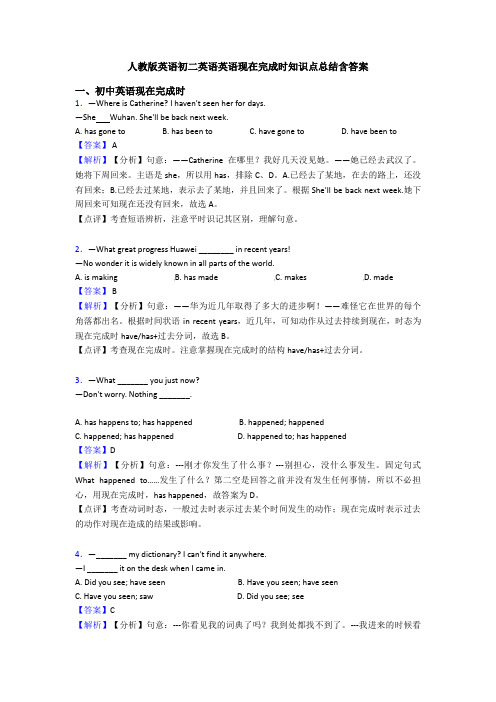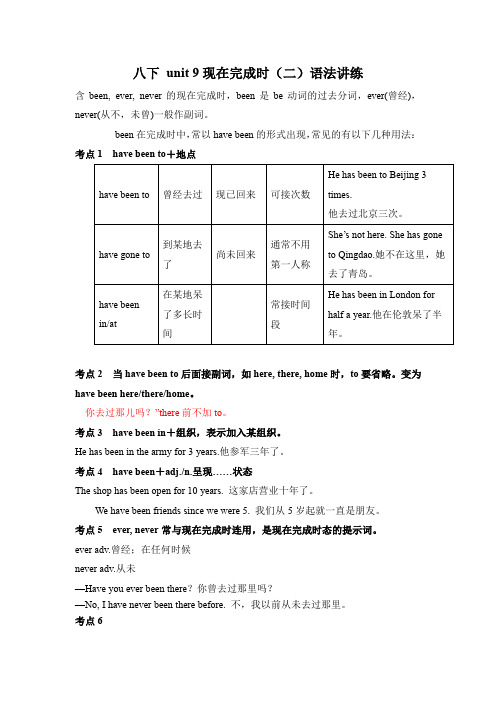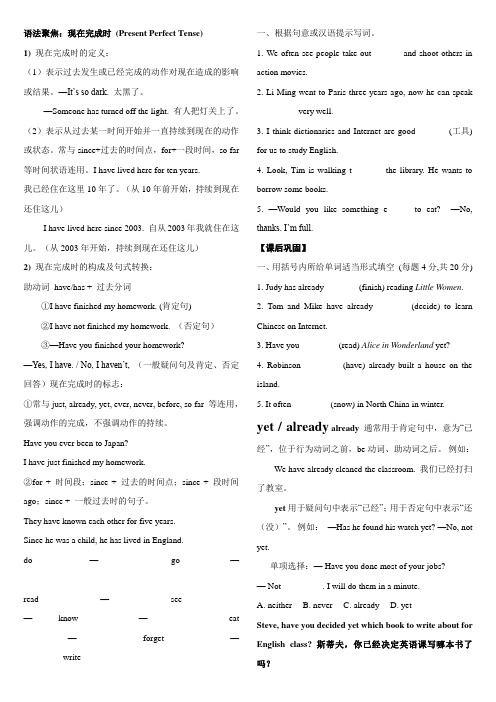人教版八年级下册英语语法-现在完成时讲解以及练习题
- 格式:doc
- 大小:337.86 KB
- 文档页数:9

现在完成时1.构成现在完成时是由助动词have(has)+动词的过去分词构成。
助动词have(has)表明事情发生于现在。
它和主语的人称、数要保持一致。
过去分词在句子中做谓语,说明句子的含义。
2.用法(1)动作发生在过去某个不确定的时间,但对现在有某种影响和结果。
常被just、already、yet 等副词修饰。
如:-Have you had lunch yet? -Yes,I have. I've just had it.你(已经)吃午饭了吗?我刚刚吃过。
(现在我不饿了)(2)表示从过去某一时刻开始一直持续到现在的动作或状态。
这个动作可能刚停止,可能仍然在进行。
常带有for和since等表示一段时间的状语。
如:He has taught here since 1981他自1981年就在这儿教书。
(可能还要继续教)I have't seen her for four years.我有四年没见到她了。
(3)表示说话前发生过一次或多次的动作,现在成为一种经验,一般译为汉语“过”,常带有twice,ever,never,three times等时间状语。
如:I have been to Beijing twice.我去过北京二次。
3.现在完成时的时间状语(1)现在完成时属于现在时范围,故不能和过去的时间状语连用。
如:yesterday,last Sunday,in1990,three years ago等。
但是,在强调动作产生的后果和影响时,可以和一些表示不确定的时间状语连用。
a. 用副词already和yet。
already一般用于肯定句中,yet一般用于否定句和疑问句中。
如:We have already finished our homework.我们已完成作业了。
They haven't finished their homework yet.他们还没有完成作业。
b.用ever 和never。

人教版英语初二英语英语现在完成时知识点总结含答案一、初中英语现在完成时1.—Where is Catherine? I haven't seen her for days.—She Wuhan. She'll be back next week.A. has gone toB. has been toC. have gone toD. have been to【答案】 A【解析】【分析】句意:——Catherine在哪里?我好几天没见她。
——她已经去武汉了。
她将下周回来。
主语是she,所以用has,排除C、D。
A.已经去了某地,在去的路上,还没有回来;B.已经去过某地,表示去了某地,并且回来了。
根据She'll be back next week.她下周回来可知现在还没有回来,故选A。
【点评】考查短语辨析,注意平时识记其区别,理解句意。
2.—What great progress Huawei ________ in recent years!—No wonder it is widely known in all parts of the world.A. is makingB. has madeC. makesD. made【答案】 B【解析】【分析】句意:——华为近几年取得了多大的进步啊!——难怪它在世界的每个角落都出名。
根据时间状语in recent years,近几年,可知动作从过去持续到现在,时态为现在完成时have/has+过去分词,故选B。
【点评】考查现在完成时。
注意掌握现在完成时的结构have/has+过去分词。
3.—What _______ you just now?—Don't worry. Nothing _______.A. has happens to; has happenedB. happened; happenedC. happened; has happenedD. happened to; has happened【答案】D【解析】【分析】句意:---刚才你发生了什么事?---别担心,没什么事发生。

人教版八年级英语下册现在完成时讲解及练习现在完成时讲解现在完成时的基本结构是助动词have/has加上过去分词(done)。
在否定句中,主语后面要加上not,构成have/has not的形式。
在一般疑问句中,have/has要提到主语前面。
简略答语中,肯定回答要用Yes,后面跟主语和have/has;否定回答要用No,后面跟主语和haven't/hasn't。
现在完成时可以表示过去发生或已完成的动作对现在的影响或结果。
比如说,“I have spent all of my money (so far)”表示现在我没有钱花了。
另外,现在完成时也可以表示发生在过去某一时刻的、持续到现在的动作或状态。
这时常常和for(+时间段)或since(+时间点或过去时的句子)连用。
例如,“Mary has been ill for three days”表示玛丽已经生病三天了,“I have lived here since 1998”表示我自1998年以来一直住在这里。
现在完成时还有一些标志词,可以表达过去完成的动作对现在的影响。
这些标志词包括already、just和yet。
例如,“He has al ready got her help”表示他已经得到她的帮助,“He hasn't come back yet”表示他还没有回来。
This is the best film I have ever seen。
I have never seen a better movie before.He has never been to Beijing before。
He has never had the chance to visit Beijing.He says he has been to the USA three times already。
He has had the opportunity to visit the USA on three separate ns.So far。

八下unit 9现在完成时(二)语法讲练含been, ever, never的现在完成时,been是be动词的过去分词,ever(曾经),never(从不,未曾)一般作副词。
been在完成时中,常以have been的形式出现,常见的有以下几种用法:考点1 have been to+地点考点2 当have been to后面接副词,如here, there, home时,to要省略。
变为have been here/there/home。
你去过那儿吗?”there前不加to。
考点3 have been in+组织,表示加入某组织。
He has been in the army for 3 years.他参军三年了。
考点4 have been+adj./n.呈现……状态The shop has been open for 10 years. 这家店营业十年了。
We have been friends since we were 5. 我们从5岁起就一直是朋友。
考点5 ever, never常与现在完成时连用,是现在完成时态的提示词。
ever adv.曾经;在任何时候never adv.从未—Have you ever been there?你曾去过那里吗?—No, I have never been there before. 不,我以前从未去过那里。
考点6表示过去已经开始,持续到现在的动作或状态。
此时常与“for+一段时间”或“since+过去的点时间或从句(从句用一般过去时)”以及so far(到目前为止)等时间状语连用。
I’ve lived here since 2000.自从2000年我就住在这里。
=I’ve lived here since 13 years ago.=I’ve lived here for 13 years.=It is 13 years since I began to live here.注意:①在这类句子的肯定句和疑问句中谓语动词必须用延续性动词。

语法聚焦:现在完成时(Present Perfect Tense)1) 现在完成时的定义:(1)表示过去发生或已经完成的动作对现在造成的影响或结果。
—It’s so dark. 太黑了。
—Someone has turned off the light. 有人把灯关上了。
(2)表示从过去某一时间开始并一直持续到现在的动作或状态。
常与since+过去的时间点,for+一段时间,so far 等时间状语连用。
I have lived here for ten years.我已经住在这里10年了。
(从10年前开始,持续到现在还住这儿)I have lived here since 2003. 自从2003年我就住在这儿。
(从2003年开始,持续到现在还住这儿)2) 现在完成时的构成及句式转换:助动词have/has + 过去分词①I have finished my homework. (肯定句)②I have not finished my homework. (否定句)③—Have you finished your homework?—Yes, I have. / No, I haven’t, (一般疑问句及肯定、否定回答)现在完成时的标志:①常与just, already, yet, ever, never, before, so far 等连用,强调动作的完成,不强调动作的持续。
Have you ever been to Japan?I have just finished my homework.②for + 时间段;since + 过去的时间点;since + 段时间ago;since + 一般过去时的句子。
They have known each other for five years.Since he was a child, he has lived in England.do __________ —____________ go__________ —___________read ______ —______ see _________ —______know____________ —_____________ eat _______ —_________ forget _________ —_________write________-______ 一、根据句意或汉语提示写词。

现在完成时Teaching aims:1.学生了解动词的过去式和过去分词。
2.学生掌握理解现在完成时态的用法。
3.学生基本会用现在完成时。
Teaching important and difficult points:1.现在分词的变化形式。
2.现在完成时for与since的用法区别。
3.瞬间动词转换成延续性动词。
Teaching procedures:Step1.现在完成时的构成:肯定句:have/has +done否定句:have/has +not+done一般疑问句:Have/Has+主语+done?Step 2.现在完成时的主要用法:用法一:表示过去发生的某一动作对现在造成的影响或结果.I have already read this book.我已经读过这本书了。
(知道书中的内容)I have washed my clothes already .我已经洗了衣服。
(衣服洗干净了)I have just finished my homework.我刚做完我的家庭作业。
(作业没有了)用法二:表示过去某个时间开始的动作一直持续到现在并且还有可能持续下去。
for+时间段since+时间点/句子I have learnt English for more than ten years.我已经学了10多年的英语。
(从10年前开始,持续到现在还在学)She has swum since half an hour ago.她已经游泳了半个小时。
(半个小时前已经开始游泳,到现在还在游)Step3.现在完成时的时间状语:现在完成时常与副词already, yet, never ,just,ever 等连用。
1. already 意为“已经”,通常用于肯定句,可放在助动词之后,过去分词之前,也可放在句末。
2. yet 在疑问句中意为“已经”,在否定句中意为“还(没)”,放在句末。
3. never 意为“从来没有”常与before连用,多放在助动词与过去分词之间。
八年级英语下册 -现在完成时讲解和练习试题-人教新目标版现在完成时练习die → be dead come back → be backgo out → be outleave → be away get up → be upfinish → be over put on → wear 或 be on1.构成open → be open join → be in 或 be a member of close → be closed go to school → be a student现在完成时是由助动词have(has)+动词的过去分词构成。
助动词说明该谓语是属于现在时范borrow → keep buy → have围。
它和主语的人称、数要保持一致。
过去分词是主要的谓语动词,说明句子的意义。
如: He has been a soldier for three years.他参军三年了。
2.用法His father has been dead for two years.他父亲去世二年了。
( 1)表示动作发生在过去某个不确定的时间,但对现在留下了某种影响和结果。
常被just 、The film has been on for ten minutes. 电影已开始十分钟了。
already、 yet 等副词修饰。
如:We have studied English for three years. 我们(开始)学英语已三年了。
-Have you had lunch yet? -Yes,I have. I've just had it. 5.现在完成时和一般过去时的区别你(已经)吃午饭了吗?我刚刚吃过。
(现在我不饿了)现在完成时和一般过去时都表示在过去完成的动作。
但现在完成时强调的是这一动作与现( 2)表示从过去某一时刻开始一直持续到现在的动作或状态。
这个动作可能刚停止,可能仍然在的关系。
如对现在产生的结果或影响等,而一般过去时只表示动作在过去某一时刻发生,不在进行。
现在完成时讲解一.基本结构:助动词have/has+过去分词(done)二.句型:否定句:主语+have/has+not+过去分词+其他.一般疑问句:Have/Has+主语+过去分词+其他.简略答语:Yes,主语+have/has.(肯定)No,主语+haven't/hasn't.(否定)三.用法(1)现在完成时表示过去发生或已经完成的动作对现在造成的影响或结果I have spent all of my money(so far).(含义是:现在我没有钱花了.)Guo zijun has(just/already)come.(含义:郭子君现在在这儿)My father has gone to work.(含义是:我爸爸现在不在这儿)(2)现在完成时可以用来表示发生在过去某一时刻的,持续到现在的动作(用行为动词表示)或状态(be动词表示)常与for(+时间段),since(+时间点或过去时的句子)连用.①f or+时段②s ince+过去一个时间点(译为:自从……以来)③s ince+时段+ago④s ince+从句(过去时)●⑤I t is+时段+since+从句(过去时)Mary has been ill for three days.I have lived here since1998.四.has gone(to),has been(to),has been(in)的区别Have/Has gone(to):去了(现在不在说话现场)Where is your father?H e has gone to Shanghai.Have/Has been(to):去过(已不在去过的地方)My father has been to Shanghai.Have/has been in:呆了多久(还在所呆的地方)My father has been in Shanghai for two months./sin ce two months ago.五.现在完成时的标志1.现在完成时的含义之一是过去完成的动作对现在仍有影响,用以下四大标志词可以表达这种含义:*以already,just和yet为标志He has already got her help.他已得到她的帮助。
八年级下英语现在完成时讲解及练习(4页)(总5页)--本页仅作为文档封面,使用时请直接删除即可----内页可以根据需求调整合适字体及大小--现在完成时一、现在完成时态的结构 have /has (助动词)+done(过去分词)说明:动词的过去分词有规则形式和非规则形式两种,非规则分类:AAA、ABB、ABA、ABCAAA cost-cost-cost,hit-hit-hit,let-let-let,ABB buy-bought-bought,catch-caught-caught,ABA come-came-come,become-became-become ,run-ran-runABC break-broke-broken,fly-flew-flown,ride-rode-ridden ,take-took-taken,二、现在完成时态的基本句式肯定句:主语+have/has+Vpp+其他否定句:在助动词have/has后加上否定词not一般疑问句:将助动词have或has提到句首,肯定的简略回答是:Yes,主语+have/has. 否定的简略回答是:No,主语+have/has not.特殊疑问句:特殊疑问词+一般疑问句三、现在完成时态的用法2、表示过去已经开始,持续到现在的动作或状态,可以和表示从过去某一时刻延续到现在(包括“现在”在内)的一段时间的状语连用,如for+时间段、since+过去的时间点、疑问词how long等。
例如:注意:此种用法中表示持续动作或状态的动词必须是延续性动词(否定句除外)。
例如:(1)这本书我已经买了三个月了。
错误:I have bought the book for three months.正确:I have had the book for three months.(2)你哥哥参军多长时间了?错误:How long has your brother joined the army正确:How long has your brother been in the army/been a soldier?四、现在完成时态与一般过去时态的区别3)现在完成时可表示持续到现在的动作或状态,动词一般是延续性的,如live, teach, learn, work, study, know.She joined the League three years ago. (加入的动作不是延续的)She has been in the League for three years (since three years ago). (在团内的状态可延续)She has been a League member for three years (since three years ago).是团员的状态可持续)比较 have/has been to、have/has gone to 和 have been inhave(has) been 表示“曾去过某地,已经从那里回来了”,可以和ever、never、twice 等连用。
现在完成时一、现在完成时态的结构have /has (助动词)+done(过去分词)说明:动词的过去分词有规则形式和非规则形式两种,规则形式同过去式的规则形式。
非规则形式需要特殊记忆。
可以这样分类:AAA、ABB、ABA、ABCAAA cost-cost-cost,hit-hit-hit,let-let-let,read- read-read, put-put-put,set-set-sethurt-hurt-hurt, cut-cut-cutABB buy-bought-bought,catch-caught-caught,teach-taught-taught ,find-found-found,sell-sold-sold stand-stood-stood build-built-builtsleep-slept-slept spend-spent-spentABA come-came-come,become-became-become ,run-ran-run ABC break-broke-broken,fly-flew-flown,ride-rode-ridden ,take-took-taken,write-wrote-written speak-spoke-spoken,drive-drove-driven二、现在完成时态的基本句式肯定句:主语+have/has+Vpp+其他否定句:在助动词have/has后加上否定词not一般疑问句:将助动词have或has提到句首,肯定的简略回答是:Yes,主语+have/has. 否定的简略回答是:No,主语+have/has not.特殊疑问句:特殊疑问词+一般疑问句三、现在完成时态的用法1、用来表示之前已经发生或完成的动作或状态,而其结果却和现在有联系: 动作或状态发生在过去,但它的影响现在还存在,可以和already, never, ever, just, before, yet 等副词连用。
现在完成时1.构成现在完成时是由助动词have(has)+动词的过去分词构成。
助动词have(has)表明事情发生于现在。
它和主语的人称、数要保持一致。
过去分词在句子中做谓语,说明句子的含义。
2.用法(1)动作发生在过去某个不确定的时间,但对现在有某种影响和结果。
常被just、already、yet 等副词修饰。
如:-Have you had lunch yet? -Yes,I have. I've just had it.你(已经)吃午饭了吗?我刚刚吃过。
(现在我不饿了)(2)表示从过去某一时刻开始一直持续到现在的动作或状态。
这个动作可能刚停止,可能仍然在进行。
常带有for和since等表示一段时间的状语。
如:He has taught here since 1981他自1981年就在这儿教书。
(可能还要继续教)I have't seen her for four years.我有四年没见到她了。
(3)表示说话前发生过一次或多次的动作,现在成为一种经验,一般译为汉语“过”,常带有twice,ever,never,three times等时间状语。
如:I have been to Beijing twice.我去过北京二次。
3.现在完成时的时间状语(1)现在完成时属于现在时范围,故不能和过去的时间状语连用。
如:yesterday,last Sunday,in1990,three years ago等。
但是,在强调动作产生的后果和影响时,可以和一些表示不确定的时间状语连用。
a. 用副词already和yet。
already一般用于肯定句中,yet一般用于否定句和疑问句中。
如:We have already finished our homework.我们已完成作业了。
They haven't finished their homework yet.他们还没有完成作业。
b.用ever 和never。
多用于否定或疑问句中,表示“曾经”或“从未“等。
如:-Have you ever been to the Great Wall?你曾经去过长城吗?-I have never been to the Great Wall.我从未去过长城。
c.用表示到说话为止的过去时间状语,如just,before,up to now,the past few years等。
例如:I have seen her before,but I can not remember where. 我以前见过她,但记不起在哪里见过。
He has been there three times the last few days. 近几年他去过那里三次了。
d.用包括“现在”在内的时间状语,如:now,today,this morning(month,year,term)等。
例如:-Have you met him today?-No,I haven't. 今天你见过他吗?我没有。
How many times have you been there this year? 今年你去过那里多少次?(2)现在完成时可以和带有since或for等表示“一段时间”的状语连用,表示动作或状态从某一时刻开始,一直持续到现在。
如:I haven't seen him for two years. 但是,像come,arrive,buy等终止性动词不能与表示“一段时间”的状语连用。
要用,必须改为“be(在)”等延续性动词来表述。
现归纳总结一下由非延续性动词到延续性动词的转换:arrive→be here begin(start)→be ondie →be dead come back→be backleave →be away fall ill(sick,asleep)→be ill(sick,asleep)get up→be up go out →be outfinish →be over put on →wear 或be onopen →be open join →be in或be a member of…close →be closed go to school→be a studentborrow →keep buy →havecatch(a cold)→have(a cold) get to know →knowbegin to study→study come to work→work等如:He has been a soldier for three years.他参军三年了。
His father has been dead for two years.他父亲去世二年了。
The film has been on for ten minutes.电影已开始十分钟了。
We have studied English for three years. 我们(开始)学英语已三年了。
4.现在完成时和一般过去时的区别现在完成时和一般过去时都表示在过去完成的动作。
但现在完成时强调的是这一动作与现在的关系。
如对现在产生的结果或影响等,而一般过去时只表示动作在过去某一时刻发生,不表示和现在的关系。
试比较:I have lost my new book. 我把新书丢了。
(现在还未找到)I lost my new book yesterday. 我昨天把新书丢了。
(昨天丢的,现在找到与否没说明)5.几点注意事项(1)have been(to)与have gone( to)的区别:have been(to)表示“去过某地(现在已经回来了)”,可用于各人称;have gone(to)表示“去某地了(说话时某人不在当地)”,常用于第三人称,前者可与once ,never,several times等连用,后者则不能。
如:They have been to Beijing twice.他们去过北京两次。
He has gone to Beijing . 他去北京了。
(2)如单纯表示一段时间,或强调一段时间,虽有since一词,也不必用完成时。
如:It is two years since his father died. =His father has been dead for two years.他父亲去世已有三年了。
(3)终止性动词现在完成时的否定式,已变成一种可以延续的状态,因此可以和表示一段时间的状语连用。
如:I haven't left here since 1997.自从1997年以来,我一直没有离开过这儿。
一、单项选择1. Li Hong has ________ the army for 2 years.A. joinedB. be inC. been inD. joined in2. We have been friends since ______.A. childrenB. five yearsC. five years agoD. five years before3. Mike ___________ the story for a month.A. has boughtB. has hadC. had hadD. has borrowed4. You ______ that question three times.A. already askedB. have already askedC. already have askedD. asked already5. Those foreign friends left Guangzhou __________.A. since last weekB. a week agoC. for a weekD. since a week ago6. I _____ at this school for two years.A. am studyingB. studyC. studiedD. have studied7. They _________ in the city since last summer.A. liveB. didn’t liveC. have livedD. live8. Mrs. Wang has lived in Haikou _________ 1992.A. sinceB. fromC. afterD. in9. Mr. Black _________ China since the summer of 1998.A. has been toB. has been inC. has come toD. came to10. His father _______ for years.A. has diedB. has been deadC. diedD. dies11. Mary ________ to see the films because she __________ it twice.A. won’t go, sawB. won’t go, will seeC. won’t go, has seenD. didn’t go, sees12.---- Would you like some more food?----Thank you. I _______ enough.A. will haveB. have hadC. haveD. had13. ______ you ______ England? Yes, it _____ a beautiful country.A. Will, gone to, wasB.Have, been to, isC. Had, been to, isD.Have, gone to, is14. ----_______ you _______ to Beijing?----No, I ______.I ______ there early next month.A. Have, been, haven’t, am goingB. Had, been, hadn’t, am goingC. Have, gone, haven’t, was goingD. Did,go, didn’t, was going15. ---You sister ______ to London to study English. Is that true?---Yes , she ___ there for two months.A. has been, has beenB. will go, has goneC. gone, will beD. has gone, has been16. He has a computer of his own. He ____ it two days agoA. boughtB. boughtC. boughtD. has bought17. —Where is Li Lei? —He ___ Shanghai.A. has gone toB. has been toC. went toD. goes to18. He _______ his homework and is now listening to music.A.. finishesB. has finishedC. finishD. is finishing19. David _______ Shanghai for more than three months.A. came toB. has been toC. has been inD. has come to20. --- Is your father a Party member?--- Yes, he ____ the party three years ago. He _____ a Party member for three years.A. joined; has beenB. has joined; has beenC. was joined; isD. joined; was21. ---What a nice bike! How lone ____ you ____ it? ----Just five weeks.A. will; buyB. did; buyC. are; havingD. have; had22. I ______ this book for a week .I have to return it now.A. borrowedB. have borrowedC. keptD. have kept23. ----______ your sister _______ in Green China for a long time?----Yes. She joined it five years ago.A. Has; beenB. Have; beenC. Has; joinedD. Have; joined24. ---How long have you _______ from the USA? ----For three months.A. come backB. returnedC. go backD. been back25. I _____ this book for half a year.A. have boughtB. have hadC. boughtD. had26. The students are sorry to hear that famous singer _______ for a year.A. has leftB. has goneC. has been awayD. has gone away27. --- ______ you______ your homework yet? ---Yes, I _____ it just now.A. Did; do; finishedB. Have; done; finishedC. Have; done; have finishedD. Will; do; finish28. The sand storm weather ______ in Beijing several times this year.A. happenB. happenedC. has happenedD. have happened29. ---How long have you been here? --- ____ last month.A. ForB. UntilC. BeforeD. Since30. He ____ a cold for three days.A. has caughtB. has hadC. has gotD. caught31. Jim Green ____ in China for two years.A. has comeB. has beenC. has arrivedD. came32. The film ____ for half an hour.A. has been onB. has begunC. hasn’t begunD. began33.—Where have you _______ these days?—I have to Beijing with my friends.A. been;goneB. been;beenC. gone;beenD. gone;gone34.How long have you _______ this book?A. bought B.borrowed C.had D.lent35. We have lived here _______ five years ago.A. when B.since C.before D.after36.—I have watched the game.—When _____you _______ it?A.have;watched B.do;watch C.did;watch D.will;watch37.—How do you like Beijing, Mr. Black?—Oh,I _______ such a beautiful city.A.don't visit B.didn't visit C.haven't visited D.hadn't visited38.Miss Brown _______ to the Great Wall twice.A.have been B.has been C.have gone D.has gone39.His brother has been to Stone Forest twice ______ he came to Yunnan.A.after B.before C.since D.for40.His grandpa _______ for two years.A.was died B.has been dead C.was dead D.has died41.—Have you ever_______ to Haikou?—Yes,I_______ there with my family last August.A.gone;went B.been;went C.been;went to D.been;was in42. His sister ______ her hometown for three years. She'll return next year.A.left B.has left C.has been away D.has been away from以适当形式填空1. I_______ already _______ (see) the film. I _________ (see) it last week.2. ----- _______ he ________(finish) his work today ? ------Not yet .3. -----_____you _______(be) to Hong Kong ?----Yes, I ________________ (be) there twice .4. -----_______ you ever ________(eat ) chocolate sundaes ? ----No, never.5. My father ____ just ________ (come) back from work. He is tired now.6. Where’s Li Ming ? He ____________ (go) to the teacher’s office.7. Shanghai _______ (be) a small town hundreds of years ago. Now it ____ (become) a large city.8. I _____________ (work) here since I __________ (move) here in 1999.9. So far I ______________(make) quite a few friends here.10. ---How long ______ the Smiths ________(stay)here? ---- For two weeks.11. --- I ___________ (see) the film “Chicken Run”.--- Where and when ________ you _______ (see) it?--- Last week.12. Mary _____ already _______ (have) her supper.13. I ____________ (not want) to see the film. I ___________ (see) it with my parents. We _________ (see) it last Sunday.14. ---______ Uncle Wang ______ (mend) the TV yet?---Yes, he______.---When _____ he _____ it?--- Yesterday.15. ______ you _______ (read) today’s newspaper yet?16. They _____already_____(do) their homework. But they don’tknow what_____ (do) next.17. ---____ you _____ (see) the film last night?---No, I ___________ (see) it for several times.18. She ____________ (be) ill for three days.19. My father ___________ ( buy) a book for me yesterday. He____ already _________(pay) fifty yuan for it.20. She____________ (not read) this book before.21. ____ you ever __________ (travel) on a train before?22. --- ____ Wei Hua _____ (come) yet?---Yes. She_______ (come) already. She ______ (come) just now.23. ---How long _____you __________(learn) English?---For more than two years.24. They _______________ (live) in China since they _____ (move) to China. 句型转换(每空一词)。